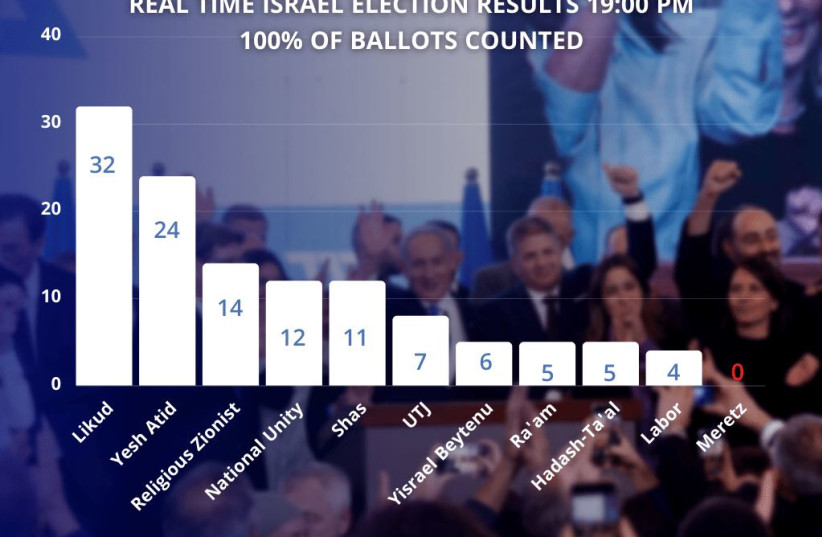Israel is now entering unchartered waters after Benjamin Netanyahu was once again elected prime minister in the November 1 election, this time at the head of a coalition comprising two right-wing and two ultra-Orthodox religious parties.
“The most right-wing government in Israel’s history” is one of those phrases journalists like to use (or misuse) and has been trotted out repeatedly after previous election victories by Netanyahu. However, this time it rings true.
Israel has always maintained an uneasy balance between its democratic and Jewish character. Some hope, while others fear, that the new government will now shift the balance dramatically in favor of the Jewish side.
Victory in the election represents a remarkable comeback for Israel’s longest-serving prime minister who had failed to clinch a parliamentary majority in the last four elections, plunging Israel into almost four years of political instability.
This time, however, the pro-Netanyahu bloc secured a relatively comfortable majority of 64 in the 120-seat Knesset.

All previous Netanyahu-led coalitions contained at least one left-wing, centrist or soft-right party which acted as a moderating influence. The new government will be solidly right-wing and religious. Netanyahu himself will play the role of the responsible adult, if he chooses to do so.
Netanyahu’s Likud is the largest party, with 32 seats. The far-right Religious Zionist Party with 14 seats will be Likud’s senior coalition partner. The anti-Arab, anti-gay party is demanding senior portfolios and the implementation of at least some of its radical agenda, such as the death penalty for terrorists, relaxing open-fire rules and immunity for members of the security forces for any action they might take while on operational duty.
The two ultra-Orthodox parties – Shas (11 seats) and United Torah Judaism (7) – want the immediate cancellation of the conversion and kosher certification reforms carried out by outgoing deputy Religious Services Minister Matan Kahane and insist on the strict observance of the Sabbath status quo. Netanyahu has already promised to increase funding to haredi schools that don’t teach the core curriculum subjects – English and mathematics.
Netanyahu pledged to form a stable, right-wing government that will last for four years and put an end to Israel’s recent cycle of elections, but he will need all his considerable political skills to keep the demands of his coalition partners in check.
Speaking to the Likud party faithful in Jerusalem following his election victory, he set a relatively moderate tone, promising to form a government that will “look after all the citizens of Israel, without exception, because the state is all of ours.”
“We’ll restore security, we’ll cut the cost of living, we’ll widen the circle of peace even further, and we’ll restore Israel as a rising power among the nations,” he said.
“We’ll restore security, we’ll cut the cost of living, we’ll widen the circle of peace even further, and we’ll restore Israel as a rising power among the nations.”
Likud leader Benjamin Netanyahu
The incoming coalition was bad news for women’s rights activists. Not only do the far-right and religious parties have a clear anti-feminist agenda, but the number of women in the government will shrink to nine, compared to 30 in the outgoing coalition.
Outgoing Prime Minister Yair Lapid congratulated his successor. “The State of Israel comes before any political consideration,” Lapid said. “I wish Netanyahu success, for the sake of the people of Israel and the State of Israel.”
“The State of Israel comes before any political consideration. I wish Netanyahu success, for the sake of the people of Israel and the State of Israel.”
Israeli Prime Minister Yair Lapid
The inclusion of the Religious Zionist party in the coalition is likely to strain Israel’s relations with its most important ally – the US – and with European allies. Washington said after the election that it hoped “all Israeli government officials will continue to share the values of an open, democratic society, including tolerance and respect for all in civil society, particularly for minority groups”.
US Ambassador to Israel Tom Nides called Netanyahu and said that he was looking forward to working with him. However, some reports from Washington indicated that the Biden administration is unlikely to engage with Religious Zionist ministers.
The American Union for Reform Judaism said it was “profoundly concerned” over the likely ascension of Religious Zionist leaders Bezalel Smotrich and Itamar Ben-Gvir to the cabinet and the risk that it will entail for Israel’s democracy.

Palestinian Prime Minister Muhammad Shtayyeh said the rise of Israel’s far-right was “a natural result of the growing manifestations of extremism and racism in Israeli society.”
Lebanon’s caretaker Prime Minister Najib Mikati said that US guarantees would protect a maritime border deal with Israel under a Netanyahu government.
Netanyahu had threatened to “neutralize” the agreement, which came into force last month, after years of US mediation, setting a maritime border between the two states.
Voter turnout on November 1 was surprisingly high at 71.3% – an impressive statistic, bearing in mind the fear of voter fatigue with five elections in less than four years.
Despite the 64-seat majority for the Netanyahu bloc, the final vote tally showed an almost identical number of votes for the pro- and anti-Netanyahu camps.
The popular vote was actually more for the Anyone-but-Bibi bloc, but the Netanyahu camp triumphed because Yisrael Beytenu and the Arab parties failed to sign surplus vote agreements and because Labor and Meretz and all three Arab parties ran separately.
In contrast, the Netanyahu bloc was cohesive, disciplined, better organized and united behind a single leader, Israel’s most skillful political tactician.
This was the failure of the entire left-center camp, including Yair Lapid, but also Benny Gantz, who refused to acknowledge the leadership of the Yesh Atid leader, repeating the mantra that only his National Unity party could form a government if Netanyahu failed to clinch 61 seats.
For the left, the elections marked an unprecedented disaster.
Labor managed to scrape past the threshold, winning the minimum four seats. But Meretz, for the first time in its history, failed to gain Knesset representation, falling 4,000 votes short of the threshold, which was particularly high this time around due to the large voter turnout.
“This is a very difficult moment for me and for my friends in Meretz. The election results are a disaster for Meretz, a disaster for the country, and yes, a personal disaster for me,” Meretz leader Zehava Galon commented. “I warned Prime Minister Yair Lapid several times that they were playing with fire and that if we were not careful, not just Meretz but the entire camp would pay the price. Of course, the responsibility is also mine.”
“This is a very difficult moment for me and for my friends in Meretz. The election results are a disaster for Meretz, a disaster for the country, and yes, a personal disaster for me. I warned Prime Minister Yair Lapid several times that they were playing with fire and that if we were not careful, not just Meretz but the entire camp would pay the price. Of course, the responsibility is also mine.”
Meretz leader Zehava Galon
Labor leader Merav Michaeli also blamed Lapid for “toppling” her party and Meretz.
“Yesh Atid worked against Meretz and the Labor party for the entire campaign and particularly on Election Day. Lapid couldn’t even get the Arab parties to sign surplus vote agreements. The man who was responsible for managing this battle mismanaged it,” she said.
“Yesh Atid worked against Meretz and the Labor party for the entire campaign and particularly on Election Day. Lapid couldn’t even get the Arab parties to sign surplus vote agreements. The man who was responsible for managing this battle mismanaged it.”
Labor leader Merav Michaeli
Michaeli was criticized for arrogantly refusing to merge with Meretz, despite promises from Lapid for three safe slots on the Yesh Atid slate for Labor and one for Meretz. However, Michaeli insisted that the pro-Netanyahu bloc would have won 62 seats even if she had accepted a merger with Meretz.
Pressure is mounting in Labor for Michaeli to accept responsibility and resign; but Yair Fink, number seven on the Labor list, warned that the problem runs much deeper. “I don’t think our problem can be solved by another primary,” he said. “I think the story here is bigger – and that is to rebuild the camp that has almost been erased from the political map. If we do not reinvent ourselves, then in the next elections there will be no Zionist left in Israel.”
Will the Right's radical agenda be implemented?
Among the election promises made by some in the victorious bloc was curtailing the power of the judicial branch; preventing the prosecution of sitting officials; and annulling the crimes of fraud and breach of trust, which would likely result in the end of the Netanyahu corruption trial.
It remains to be seen how much of this radical agenda will actually be implemented. Will attempts be made to legalize West Bank outposts or annex at least parts of Judea and Samaria? Will Khan al-Ahmar and other illegal Palestinian communities be removed? How far will the government go in trying to restore law and order in the Negev? How will the government act against Hamas in Gaza and Hezbollah in Lebanon?
Itamar Ben-Gvir, the head of the Otzma Yehudit (Jewish Power) party and number two on the Religious Zionist Party list, achieved rock star status during the campaign. “The time has come to impose order here,” he declared. “The time has come for there to be a landlord.”
Now that he finally has “a fully right-wing government,” Netanyahu will be under pressure to implement a radical agenda to change the face of Israel. But he is aware that steps considered racist or anti-democratic by the international community could risk turning Israel into a pariah state, harm relations with Jordan and Egypt, and reverse the achievements of the Abraham Accords.
His opponents are already warning that Israel may turn into Poland, Hungary or even Turkey. This is undoubtedly a watershed moment in Israel but no one, including Netanyahu himself, knows how it will turn out. ■
